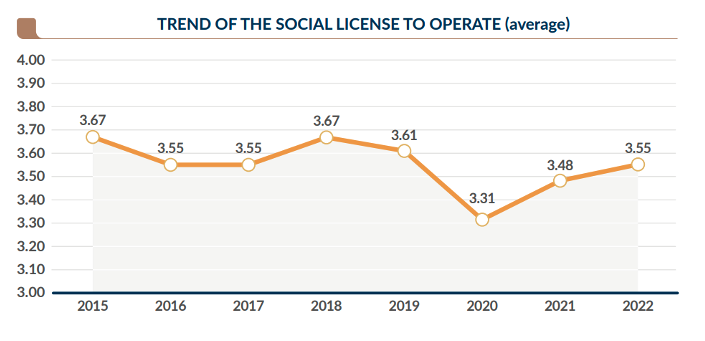Sustainable Development
MSC’s direct impact area comprises the communities of San Cristóbal, Culpina K, Vila Vila and Río Grande in the canton of San Cristóbal, first section of the municipality of Colcha K in the province of Nor Lípez, Department of Potosí.
To accomplish its goal of sustainable development, MSC intervenes in three spheres:
Community relations
Direct and permanent links with the communities in the direct impact area of the project, addressing their demands, coordinating activities and consolidating continuous and transparent communication channels.
Resettlement and mitigation
The promotion of projects to reduce environmental impacts and supervision of the works executed in the communities to optimize their quality of life.
Sustainable development
Coordination of proposals and projects for the development of the communities
We work with the Consultative Council which is made up of community leaders from the surrounding areas – San Cristóbal, Culpina K, Vila Vila and Río Grande – entrusted with the mandate of planning and deciding the path towards their development and future.
In order to improve the quality of life of the communities, there are programs to:
- Improve the education and health services.
- Optimize agricultural and tourist activities.
- Promote micro and small businesses.
- Support activities of cultural revaluation.
To achieve this vision of sustainable development, MSC and the communities have a direct and continuous relationship characterized by a permanent and participatory dialogue, mutual respect and trust, shared responsibility and compliance of the agreements and commitments, in addition to the promotion of sustainable development.
On the other hand, MSC and the Lípez San Cristóbal Consultative Council carry out the following activities:
- Pursue strategic alliances with social organizations and stakeholders to generate favorable conditions for a mutual relationship towards local development.
- Provide technical assistance so that the social organizations and community institutions would enjoy an independent and effective organizational management.
- Support capacity-building of the local authorities so they could address their demands with relevant entities and develop sustainable initiatives.
- Support social organizations and productive micro businesses in the search for strategic partnerships with a view to sustainable development of the region.
Social License to Operate
The term Social License to Operate (SLO) is widely used in the global mining industry, where it is universally understood as a reference to the level of acceptance (or approval) of an organization’s activities by the stakeholders in relation to a given activity. The LSO concept also recognizes the importance and influence of stakeholder perceptions. In addition to legal licenses and other regulatory permits issued by government, stakeholder networks also could delay, obstruct, or redirect projects if they do not accept or approve a project or its business activities.
Minera San Cristóbal was one of the first mining companies to transform the concept of social license from a metaphor to a concrete management tool, through the application of standardized metrics to arrive at a true understanding of the variables and dynamics of community perceptions. The ability to apply and document the quality of the relationship between our project and our neighboring communities was first employed retrospectively in 2008, using qualitative indicators. Since 2009, we began to monitor the SLO using a quantitative methodology. Currently, more intensive, and independent studies are conducted every 12 to 15 months, with the internal capacity to track and monitor values on a monthly or even weekly basis.
In recent years, we have been able to develop a high level of reliability in the social license measurement tool, thanks also to complementary information obtained on the nature of stakeholder perceptions and opinions. We use this data to support community engagement and the development of short- and medium-term objectives, and as input for strategic planning and, where appropriate, risk management.
The yearly comparison of the average SLO is detailed below:


